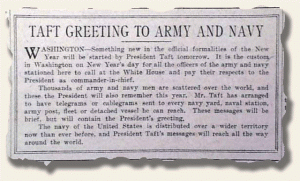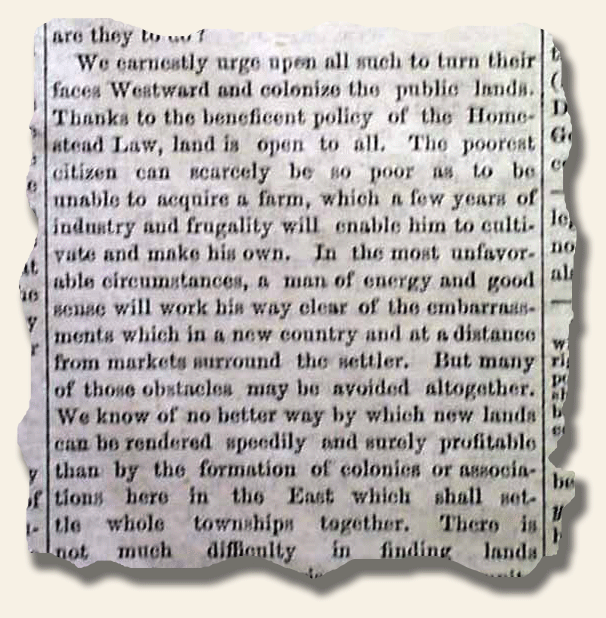Happy New Year!
December 31, 2010 by GuyHeilenman · Leave a Comment
To: The Collectors and Friends of Rare & Early Newspapers…
Have a Happy New Year!
From: The Timothy Hughes Rare & Early Newspapers Staff
The Traveler… greetings… and something to chew on…
December 30, 2010 by The Traveler · Leave a Comment
 As this year draws to an end, I traveled back 100 years to December 31, 1910. The Christian Science Monitor that day contained a variety of articles on the front page from aeroplane flights records being broken to Chicago having a record in new buildings to the fall off in Alaska gold production to the discovery of a new star! A nice automobile ad is also present.
As this year draws to an end, I traveled back 100 years to December 31, 1910. The Christian Science Monitor that day contained a variety of articles on the front page from aeroplane flights records being broken to Chicago having a record in new buildings to the fall off in Alaska gold production to the discovery of a new star! A nice automobile ad is also present.
However the article that intrigued me most was of “Taft Greeting to Army and Navy.” It had been a New Year’s custom for the officers stationed in Washington to call on the President as commander-in-chief, however there would be change this year. President Taft had arranged to have telegrams or cablegrams sent to every navy yard, naval station, army post, fleet or detached vessel he could reach. The message was brief, but was a Presidential greeting sent around the world.
the President as commander-in-chief, however there would be change this year. President Taft had arranged to have telegrams or cablegrams sent to every navy yard, naval station, army post, fleet or detached vessel he could reach. The message was brief, but was a Presidential greeting sent around the world.
As you are celebrating New Year’s with your pork and sauerkraut, consider the additional article I found in this issue, “Alfalfa As Food Served Guests” where the entire meal and beverages consisted of alfalfa, including the toothpicks being made from the alfalfa straw…
Wishing a blessed New Year to you and yours.
~The Traveler
One newspaper, nine cities…
December 27, 2010 by TimHughes · Leave a Comment
“The Memphis Daily Appeal” newspaper was one with a fascinating history during the years of the Civil War. Memphis was a Confederate stronghold up through the Battle of Memphis on June 6, 1862, at which time the Yankees moved in and it became a Yankee city. The “Appeal“, very much dedicated to the Southern cause rallying both civilians & soldiers, was the most important newspaper of the region & was soon famously known as the “Moving Appeal.”
On June 6, 1862, the presses and plates were loaded into a boxcar and moved to Grenada, Mississippi, where it stayed for a few months until approaching Federal troops threatened again, forcing a move in November 1862 to Jackson, Mississippi, where it published until May 1863, when Federal troops again arrived. By this time, the “Appeal” had gained notoriety among Union forces as a rebel sympathizer while it remained on the run. The next stop was Meridian, Mississippi, from where, one issue and two days later, the wandering journalists moved on to Mobile, Alabama, then to Montgomery, and ultimately to Atlanta, the economic heart of the Confederacy. Publication from Atlanta began in June 1863 and continued through July 1864, when it returned to Montgomery, where it published from September 1864 to April 1865. Its final move was to Columbus, Georgia, where Federal forces finally caught up with it. It resumed publication following the war in Memphis on November 5, 1865. During just a four year period this newspaper published in nine different cities. (credit: Tennessee State Library & Archives)
Merry Christmas!
December 25, 2010 by GuyHeilenman · Leave a Comment
To: The Collectors and Friends of Rare & Early Newspapers…
Have a blessed Christmas!
From: The Timothy Hughes Rare & Early Newspapers Staff
A few holiday thoughts…
December 22, 2010 by GuyHeilenman · Leave a Comment
Dear Friends of Rare & Early Newspapers,
While the holiday season is a time of celebration and joy for most, it is also a time of sadness and depression for others – as they reflect on the loss of loved ones, their own difficult  circumstances, and/or the troubles of friends and relatives. A few years ago, on the heals of the “Great Fall” of 2008, we posted a few thoughts on life. As we glide, saunter, and/or stumble (for some) through the holiday season, please enjoy reflections on this past post:
circumstances, and/or the troubles of friends and relatives. A few years ago, on the heals of the “Great Fall” of 2008, we posted a few thoughts on life. As we glide, saunter, and/or stumble (for some) through the holiday season, please enjoy reflections on this past post:
“This too shall pass” (Hebrew: גם זה יעבור, gam zeh yaavor) is a phrase occurring in a Jewish wisdom folktale involving King Solomon. The phrase is commonly engraved on silver rings.
Many versions of the folktale have been recorded by the Israel Folklore Archive at the University of Haifa. Heda Jason recorded this version told by David Franko from Turkey:
“One day Solomon decided to humble Benaiah Ben Yehoyada, his most trusted minister. He said to him, “Benaiah, there is a certain ring that I want you to bring to me. I wish to wear it for Sukkot which gives you six months to find it.” “If it exists anywhere on earth, your majesty,” replied Benaiah, “I will find it and bring it to you, but what makes the ring so special?” “It has magic powers,” answered the king. “If a happy man looks at it, he becomes sad, and if a sad man looks at it, he becomes happy.” Solomon knew that no such ring existed in the world, but he wished to give his minister a little taste of humility. Spring passed and then summer, and still Benaiah had no idea where he could find the ring. On the night before Sukkot, he decided to take a walk in one of the poorest quarters of Jerusalem. He passed by a merchant who had begun to set out the day’s wares on a shabby carpet. “Have you by any chance heard of a magic ring that makes the happy wearer forget his joy and the broken-hearted wearer forget his sorrows?” asked Benaiah. He watched the grandfather take a plain gold ring from his carpet and engrave something on it. When Benaiah read the words on the ring, his face broke out in a wide smile. That night the entire city welcomed in the holiday of Sukkot with great festivity. “Well, my friend,” said Solomon, “have you found what I sent you after?” All the ministers laughed and Solomon himself smiled. To everyone’s surprise, Benaiah held up a small gold ring and declared, “Here it is, your majesty!” As soon as Solomon read the inscription, the smile vanished from his face. The jeweler had written three Hebrew letters on the gold band: gimel, zayin, yud, which began the words “Gam zeh ya’avor” — “This too shall pass.” At that moment Solomon realized that all his wisdom and fabulous wealth and tremendous power were but fleeting things, for one day he would be nothing but dust.”
The phrase “This too shall pass” and the associated ring story were made popular by Abraham Lincoln in his ‘Address Before the Wisconsin State Agricultural Society, Milwaukee, Wisconsin’ on September 30, 1859.
“It is said an Eastern monarch once charged his wise men to invent him a sentence, to be ever in view, and which should be true and appropriate in all times and situations. They presented him the words: “And this, too, shall pass away.” How much it expresses! How chastening in the hour of pride! How consoling in the depths of affliction!
As we look back on the previous 2+ years, we see much has occurred since this posting. While we’ve lost loved ones, lost faithful collector friends, and observed many succumb to the realities of the economy, we’ve also enjoyed the strength that comes from weathering shared troubles, the joy of meeting new friends, and the quiet confidence that comes from seeing God’s hand in action in an endless number of circumstances. It is times of difficulty which encourage us to value the important things in life and to grasp the reality of “This Too Shall Pass” as we endeavor to store up treasures in heaven where moth and rust do not destroy. Please know that YOU, our dear friends, are such treasures. Thank you for your ongoing friendships.
Merry Christmas (and Happy Hanukkah to our Jewish family),
Your Friends at Timothy Hughes Rare & Early Newspapers
(Guy, Tim, Doreen, Brian, Mike, Gerry, Hannah, Sarah, Rebekah, Joshua…)
Timothy Hughes Rare & Early Newspapers . . .
. . . History’s Newsstand
“…desiring to conduct ourselves honorably in all things.” Hebrews 13:18b
“Go West, young man…”
December 20, 2010 by TimHughes · 2 Comments
I know there is dispute over who first used the oft-cited phrase: “Go West, young man…” widely attributed to Greeley. The following provides some background:
“…That is a question that is still being argued more than a century later. Horace Greeley (1811-72), founder of the New York Tribune, has long been quoted for his line in a July 13, 1865 editorial. The authorship was disputed, however, in the 1981 book, The People’s Almanac, by David Wallechinsky & Irving Wallace. They were not the first to dispute the parentage, but they certainly popularized the argument. They claimed that John B. Soule (1815-1891) penned the line 14 years earlier, in 1851, in an editorial in the Terra Haute, Indiana, Express.
That was not the end of the argument and all its permutations, however, because in September, 2004, author Thomas Fuller confused the matter even further when he published an article in the Indiana Magazine of History in which he claimed that he could not find any such quote by Soule. In fact, he could not even find a published claim for Soule’s parentage before 1890. That revelation intrigued us because we have always noticed how odd it is that a date in 1851 has never been supplied. The lack thereof always rings an alarm and suggests that the writer is merely quoting someone else. So, let us look at the evidence.
Hal Gordon wrote this summary of Greeley’s editorial:
Greeley’s editorial in the New York Tribune in 1865 was addressed specifically to young civil servants in Washington, D.C. who were complaining that the government didn’t pay them enough, given the high cost of living in the nation’s capital. Greeley had scant sympathy for them. He wrote: “Washington is not a place to live in. The rents are high, the food is bad, the dust is disgusting and the morals are deplorable. Go West, young man, go West and grow up with the country.”
Despite the controversy, there seems to be a general consensus among the many citations on the internet that Greeley used the phrase in his July 13, 1865 editorial, as noted above. I have the Tribune of the 13th and scoured through the issue yet never found the quote. The closest I could come is in “The Homestead Law” piece, page 4 col. 4, where he mentioned: “…We earnestly urge upon all such to turn their faces Westward and colonize the public lands…” (see below).
Am I missing something? Does the phrase actually exist somewhere in this newspaper? Could one erroneous citation many years ago have been cited again and again without anyone actually checking the newspaper to verify? Perhaps some collectors have this issue, or perhaps another edition with this famous quote. I would appreciate hearing from anyone who might be able to offer some helpful information.
Cigarettes do not cause cancer…
December 18, 2010 by TimHughes · 1 Comment
Hindsight means everything when it comes to history, and browsing through the pages of newspapers from years ago can often turn up reports which now are almost humorous in their inaccuracy. One item: “Clears Cigarettes As Cancer Source”, which appeared in the July 10, 1928 issue of the “New York Times“, provides some interesting reading in light modern scientific research about the effects of cigarette smoking and cancer.
The Traveler… West Florida and fencing…
December 16, 2010 by The Traveler · Leave a Comment
 This weeks travels brought me to the Connecticut Mirror dated December 17, 1810 where I found the second page to contain numerous articles pertaining to the independence of West Florida. Included is President James Madison’s message including the proclamation in which a portion states “Now be it known, that I, JAMES MADISON, President of the United States of America in pursuance of these weighty and urgent considerations, have deemed it right and requisite, that possession should be taken of the said territory, in the name and behalf of the U. States…” Letters from both the Florida and West Florida’s are in this issue as well.
This weeks travels brought me to the Connecticut Mirror dated December 17, 1810 where I found the second page to contain numerous articles pertaining to the independence of West Florida. Included is President James Madison’s message including the proclamation in which a portion states “Now be it known, that I, JAMES MADISON, President of the United States of America in pursuance of these weighty and urgent considerations, have deemed it right and requisite, that possession should be taken of the said territory, in the name and behalf of the U. States…” Letters from both the Florida and West Florida’s are in this issue as well.
This issue carries numerous advertisements – one being illustrated. It is an unusual one of a Fencing Exhibition being held by Mr. P. Thomas with an admission price of 37-1/2 cents!
~The Traveler
What could have been…
December 13, 2010 by TimHughes · Leave a Comment
One might wonder how some significant events in history might have been responded to had reaction been different from what the history books note. During the Civil war the “Albany Atlas” decided to fool with history a bit following the Emancipation Proclamation, and supposed a “Counter Proclamation” by the Confederate President, Jeff Davis. The article shown–which appeared in the Confederate newspaper “Memphis Daily Appeal” of January 23, 1863 (while printing in Jackson, Mississippi at the time)–makes for some interesting reading on what could have happened in history (see below).
A collector sells bound volumes in 1878…
December 11, 2010 by TimHughes · Leave a Comment
This advertisement appeared in the “Scientific American” issue of June 22, 1878, noting a collector who has various bound volumes of the title, selling for $1 each. How prices have changed.






